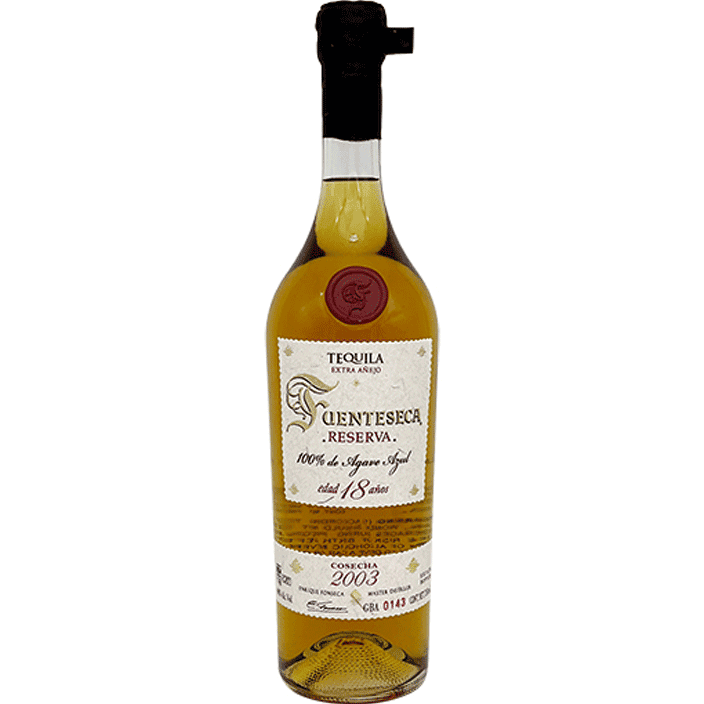
Fuenteseca Extra Anejo 18 Year Tequila
This lot was distilled in September 1995, and upon completion of one-year aging in 180L Canadian white oak casks previously used for aging Canadian rye whiskey, was certified as an anejo tequila by the Tequila Regulatory Council. The barrels were stored at a warehouse locate at 4,600' in the town of Atotonilco el Alto, Jalisco, and consisted of 75% spirit distilled in copper column stills and 25% spirit distilled in copper alembic stills. The casks remained in Atotonilco for a total of five years.
In 2001, after five years' aging in Atotonilico el Alto, the tequilas were extracted from their casks, blended together and re-barreled, with 47% going back into Canadian white oak casks, and the remaining 53% going into 220L European dark oak barrels previously used to age California red wine. The refilled casks were then moved from Atotonilco el Alto to a hillside facility El Chapingo, with its cooler, breezier climate, and left to age for an additional thirteen years before final blending and adjustment to master distiller Enrique Fonseca's optimal proof for this lot of 43.5% ABV.
With a soft golden luster and light viscosity, the Fuenteseca 18yr is at first glance a refreshingly un-manipulated spirit, lacking the added coloring and accentuated flavorings common among more commercialized extra anejo tequilas. Opening the cork closure reveals light aromas of pear and jasmine flower, with an enticing dry wood spice. The entry is rich, round and creamy with hints of granny smith apple and soft vanilla. Cedar and sandalwood notes gradually emerge, along with a moderate acidity. The extended finish is clean and balanced with a trail of minty green apple.

Explore a World of Spirits and Liquor through our Comprehensive FAQ Section.
Discover a World of Spirits and Liquor in our Helpful FAQ Section.
Types of Spirits
- Whiskey: Made from fermented grain mash and aged in wooden casks.
- Vodka: Typically distilled from grains or potatoes and known for its clear, neutral flavor.
- Rum: Produced from sugarcane byproducts like molasses or sugarcane juice.
- Tequila: Made from the blue agave plant, primarily in the area surrounding Tequila, Mexico.
- Gin: Distilled with botanicals, primarily juniper berries, giving it a distinctive flavor.
Production Process
- Fermentation: The process where yeast converts sugars into alcohol.
- Distillation: Separating alcohol from the fermented mixture to increase its concentration.
- Aging: Storing spirits in barrels to develop flavors over time.
Tasting and Pairing
- Tasting Notes: Learn to identify different aromas, flavors, and textures.
- Food Pairings: Discover which spirits complement various dishes, enhancing the dining experience.
Cocktails and Mixology
- Classic Cocktails: Recipes and techniques for making popular drinks like the Old Fashioned, Martini, and Mojito.
- Mixology Tips: How to balance flavors and create your own cocktail recipes.
History and Culture
Origins: The historical background of different spirits.
Cultural Significance: How spirits are enjoyed and celebrated around the world.

